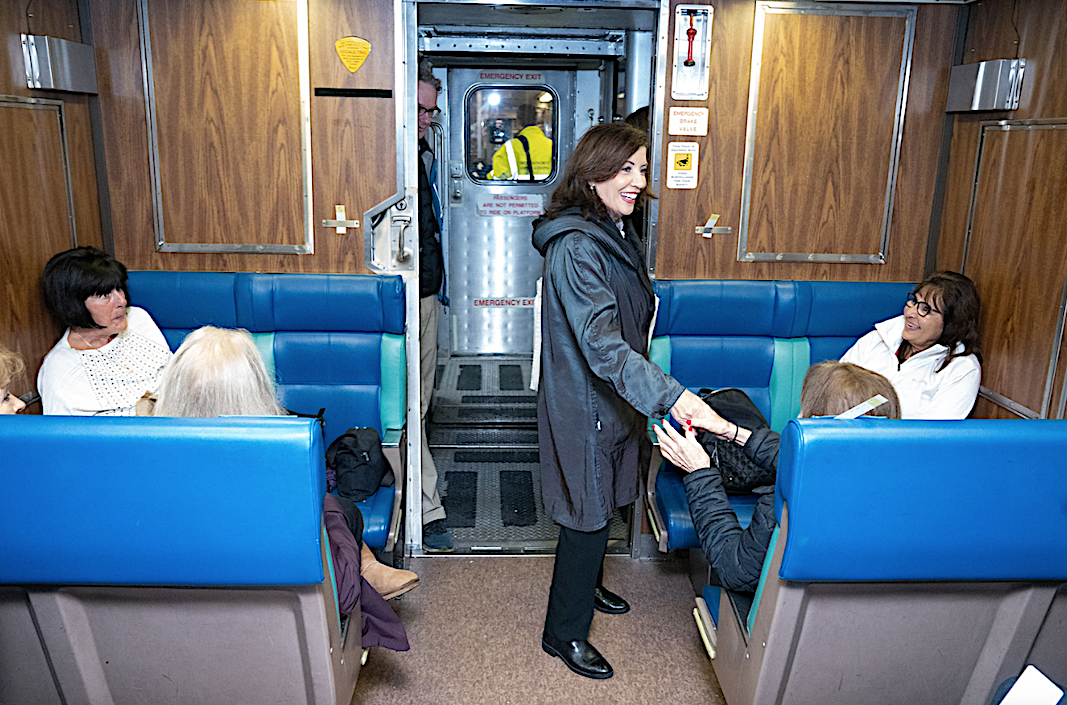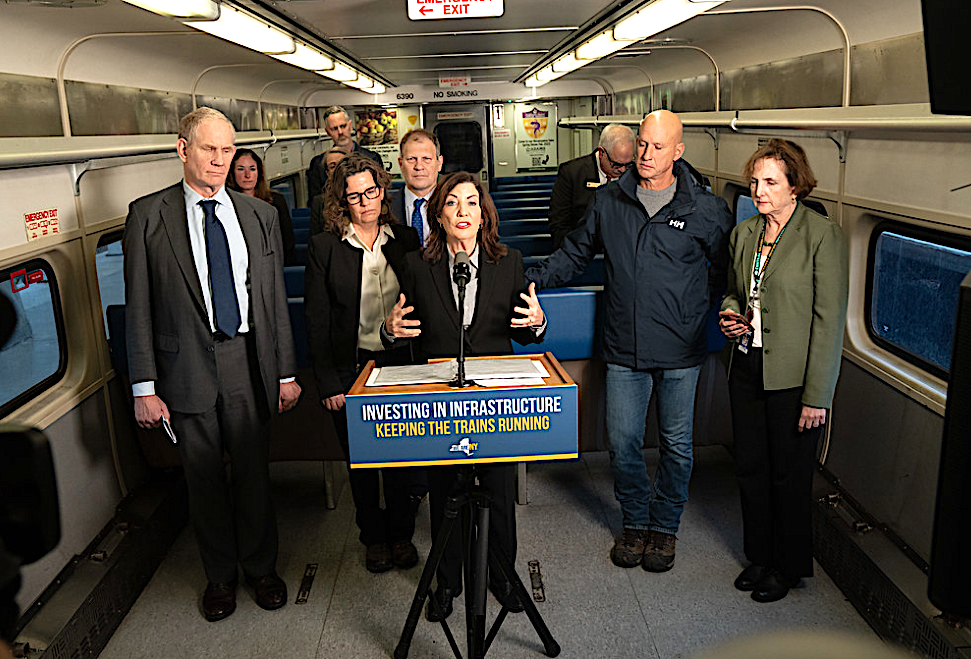New York Gov. Kathy Hochul, MTA Chair and CEO Janno Lieber and Metro-North Railroad President Catherine Rinaldi gathered with local elected officials in a Metro-North train car that was parked at the Garrison Metro-North station on Dec. 11 to highlight improvements made during 2024 to the Metro-North system. Hochul had taken Metro-North from Grand Central Station to Garrison, where she spent time on the platform chatting with MTA riders, workers and officials even though there was some intermittent rain.

Hochul and others praised the progress that has been made with improvements on Metro-North as well as the plans for further capital spending. They made their remarks inside of the stopped Metro-North train at the Garrison station. They repeated their support for the Congestion Pricing tolls due to go into effect Jan. 5 that would raise money for MTA Capital Plan spending. The tolls would be imposed on drivers entering Manhattan’s Central Business District at 60th Street.
Hochul had harsh words for Republican Congressman Mike Lawler who represents parts of the Hudson Valley and has opposed congestion pricing.
“People who are more interested in weaponizing issues and ignoring the needs of their constituents, they can deal with that with their own electorate,” Hochul said. “These are critically important investments that are not for the entire state. It is a geographic area from the Hudson Valley, the city, out to Long Island. That region cannot function at the level it should if we do not have a high-functioning, well-financed, supported infrastructure system for public transportation. He’s trying to pit a very small number of people to the detriment of the vast majority and I think that’s what people should be talking about.”

Lieber said, “I did ask Mike Lawler when he came to threaten me about Congestion Pricing, ‘would you do something to help the MTA? We are 45% of the nation’s mass transit riders; we get 17% of federal money. We’re in the majority, sir. Can you help us?’ Not a word. Not a word in response.”
Hochul was asked whether she would use flattery as a strategy to encourage President-elect Donald Trump not to follow through on his campaign pledge to kill Congestion Pricing once he takes office.
“I don’t play games. I’m not going to flatter somebody,” Hochul said. “I’m going to tell you this: he understands more than any previous president how important this system is. It is the lifeblood of our city and our region. He still is a significant landowner. He’s still an employer. He still has resources in this area and he knows what will happen if we don’t make these investments and this system becomes crippled, so I know that he will look at those facts and work with me as he said he wants to do to make sure that we can achieve our common objective of solving New York City’s and the region’s problems and giving people the service and the systems they deserve.”
Rinaldi said, “Major capital investments across Metro-North will give our customers the safe, green and reliable railroad that they deserve. New locomotives will reduce air pollutants, and the replacement of the Park Avenue Viaduct, Grand Central Train Shed, major investments in Harlem Line stations and Hudson Line resiliency will ensure that the Metro-North network will continue to drive the regional economy for years to come.”
The officials pointed out that the recent construction work at the Garrison station included replacement of portions of all platforms and new staircases. Stations in Hartsdale, Scarsdale and Purdys were made fully ADA accessible this year, bringing the total number of accessible Metro-North stations to 124.
Metro-North recently took delivery of the first two of 33 new locomotives that can run independent of the electrified third rail and are used for trains that serve Poughkeepsie, Southeast, Danbury and Waterbury.
It was reported that Metro-North continues to surpass pre-Covid ridership numbers and carried 6.5 million riders in October, an increase of 13% from September and a 16.2% percent increase from October 2023. Metro-North’s average weekday ridership of 230,449 was at 79.2% of the pre-Covid level in October 2019. The average weekend ridership of 131,666 was 2.2% higher than pre-Covid level in October 2019.
Hochul said that for “those who want to play political games with our transportation future, instead of ensuring that we have reliable service, I have a simple message: look at the facts, look at the investments, look at the results. And I assure you that the people you claim to represent have a very different opinion of what they’re looking for in their transportation system.”






















